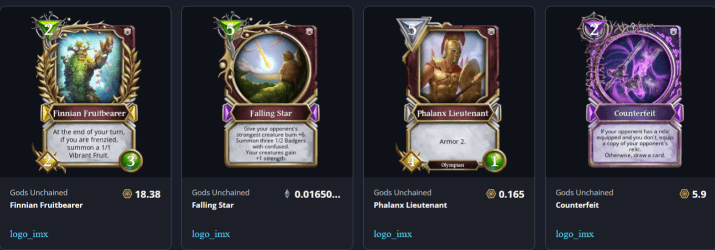NFTs can be categorised in many ways — collectible and playable NFT trading cards among them. These NFTs are similar to traditional NFT trading card collections trading cards, with values that depend on the market conditions, consumer desirability and rarity.
What is a trading card NFT?
A non-fungible token — better known as an NFT — is a one-of-a-kind digital asset that can take the form of a graphic, audio file, video clip, GIF and more. You can even buy an NFT character to play within video game metaverses.
An NFT trading card is created by taking a digital file and converting it into a cryptocurrency token that exists on a blockchain — a public ledger on which transactions are recorded. Collectors purchase trading card NFTs to display in a personal gallery or sell on the secondary market with the hopes of earning a profit.
It's not only the NFT that's recorded on a blockchain: Each transaction involving that NFT is recorded as well, allowing for the creator who minted the NFT to earn royalties on each sale down the line.
Most NFT trading cards are bought and sold using cryptocurrency on online marketplaces.
How does a trading card NFT work?
Trading card NFTs can vary in utility. Many collectors buy them to show off for clout or bragging rights, just as hobbyists do with physical cards at conventions. Others collect NFT cards as investments, selling off those that appreciate in value.
NFT-based trading card games — or TCGs for short — are popular among those who enjoy role-playing or battling. Games like the multiplayer blockchain game Gods Unchained allow players to create decks of NFT trading cards that are used to battle other players.

Image source: Immutable - Gods Unchained
With Axie Infinity, players rely on NFT cards to give their Axies special abilities that are helpful in battles.

Image source: Axie World
The industry is similar to IRL trading card games like Magic: The Gathering or Pokémon TCG, where deck builds or cards are valued depending on their use, rarity and popularity.
Yet gaming isn't the only space for NFT trading cards — you can buy sport trading cards NFTs through online marketplaces like NBA Top Shot, which specialises in selling NBA player NFTs.
Finder survey: What assets do Australians invest in?
| Response | |
|---|---|
| None | 36.47% |
| Individual stocks | 34.39% |
| Real estate | 19.13% |
| Bitcoin | 18.33% |
| Index funds (e.g. ETFs) | 17.74% |
| Ethereum | 11.4% |
| Other cryptocurrencies | 11% |
| Forex | 5.05% |
| Other | 4.96% |
| Commodities | 4.26% |
| Stablecoins | 2.58% |
Trading card NFT marketplaces
Deciding on a marketplace for trading card NFTs depends on the genre you're interested in, among them:
- NBA Top Shot — NBA-licensed marketplace featuring NFTs of NBA video clips, players and team packs.
- OpenSea — Mixed marketplace that includes gaming trading cards, sports, blockchain gaming NFTs and more.
- Sorare Marketplace — Fantasy soccer marketplace featuring player trading cards.
- Waxstash – Marketplace built on the Worldwide Asset eXchange featuring Funko, Splinterlands and other NFT trading card collections.
NFT trading card collections
The market for trading cards is expansive, with many collections and games to browse.
Popular trading card collections include:
- Age of Chains
- Axie Infinity
- Candy Digital
- Curio Cards
- Crypto Strikers
- Gods Unchained
- Sorare
- Spells of Genesis
How to make money with trading card NFTs
How you make money with NFT trading cards doesn't differ much from making money with trading cards IRL.
You focus on collecting rare or high-profile NFTs with the goal of selling them for a profit as they appreciate. You can also keep an eye on scheduled drops to grab limited cards to sell on the secondary market.
There's nothing stopping you from creating your own line of trading cards and hoping to earn. Yet because many trading card NFTs are licensed through organisations like the NFL or minted by video game companies for use within associated metaverses, it's not as easy for smaller creators to compete in the market.
What makes NFT trading cards valuable
The biggest factors affecting NFT trading card value are consumer interest and rarity. Rare precious metals are valuable because they're uncommon, and same for rare NFTs.
Driving forces in trading card values are:
- Rarity. If it's hard to get your hands on a particular NFT or collection, it's going to be worth more on the market.
- Utility. In gaming, cards offer unique applications or represent stronger or weaker game characters..
- Certification. Many sports trading cards are backed by licensing from official sports clubs or leagues.
Like with traditional trading cards, values of NFT trading cards can fluctuate by the second. New NFTs and collections are released all the time, and trends — especially gaming trends — change. Keep a close eye on drops, news and play styles for help in deciding what to buy and sell.
How to buy NFT trading cards
You can buy, sell and trade NFT trading cards by signing up for a marketplace or game that offers them. While steps differ among these platforms, you can expect to follow four general steps:
- Set up a digital wallet. Compare top crypto wallets like MetaMask, WalletConnect or Ledger.
- Add crypto to your wallet. Buy crypto from an exchange with fiat currency and transfer it to your digital wallet. Or transfer tokens you already own to your wallet.
- Choose a marketplace or game. Look for NFT collections on marketplaces and games like OpenSea, NBA Top Shot, Candy Digital, Axie Infinity and Upland, among many other marketplaces.
- Choose a trading card NFT. Most marketplaces allow you to filter by collection and creator to narrow down your options, with NFTs sold at fixed prices or at auction.
You'll need to transfer trading cards designed for use in a game to your account or wallet attached to that game. For example, the play-to-earn game Bomb Crypto requires a MetaMask wallet.
Compare NFT marketplaces
NFT trading card fees
You can expect to pay a transaction fee when buying NFTs. Called gas fees, they're used to cover the cost of powering the exchange of cryptocurrency — like a processing fee. How much you pay to complete a transaction varies depending on the day and the blockchain.
Gas fees are typically the only fee you're likely to encounter when purchasing NFTs.
What to watch out for
NFTs are stored in digital wallets. Keeping your digital wallet safe is largely your responsibility — meaning, you must safeguard your password to minimise the risk of hacking or theft. And marketplaces typically aren't accountable for fraudulent purchases, nor will they refund your money if you're unhappy.
Look out for common scams when buying, selling or trading NFT trading cards:
- Illegitimate trading cards. You can minimise purchasing fake or otherwise fraudulent NFTs by buying from a legitimate marketplace and looking for seller verification marks — like a blue check next to the seller's username.
- Phishing and catfishing. Always go directly to the marketplace to buy, sell or trade an NFT, rather than click an embedded button from an email or on a forum. And never give your keys to somebody who says they need them to complete your purchase.
- Rug-pulling scams. Do your research before jumping on a collection that sounds too good to pcgambe true. NFT promoters have been known to draw in buyers with promises of future wealth only to stop trading and run off with hopeful investors' money.
While the NFT world is exciting, it's still new and largely unregulated. Consider all possibilities when making large investments, and don't spend more than you can afford to lose.
Sources
Ask a question
More guides on Finder
-
What are cross-chain NFTs?
Need to put an NFT on another blockchain? Here’s how.
-
How to make money in the metaverse
Learn how you can bank in on the metaverse hype or carve out a career in this expansive virtual space.
-
How to sell NFTs in Australia
How to sell NFTs in 4 steps.
-
How to mint an NFT
Step-by-step guide on minting an NFT.
-
How to join the metaverse
Learn about different types of metaverses and what you’ll need to join one.
-
Champions Ascension guide: A P2E NFT action-RPG by Jam City
What we know so far about the upcoming NFT-based blockchain game, Champions Ascension
-
How to play Decentraland
Learn how to play with one of the largest cryptocurrency metaverses in the world.
-
NFT statistics reports for 2022
The definitive ranking of the NFT adoption across 26 countries.
-
How and where to buy NFTs
Read our step-by-step guide to buying NFTs, including what you need to get started and which marketplaces you can use in Australia.
-
How to make an NFT
Creating an NFT is easier than you might think. Here are 5 steps to make an NFT, and other details you should know.
